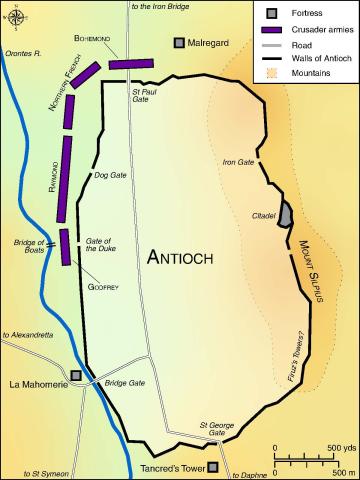The Crusaders Besiege Antioch
[7.18.7] Crastinā vērō dīē summō dīlūculō exiērunt aliī Turcī dē cīvitāte, et colligērunt omnia cadāvera foetentia Turcōrum mortuōrum, quae reperīre potuērunt super rīpam flūminis, exceptīs illīs quae in alveō latēbant ēiusdem flūminis; et sepeliērunt ad machumāriam quae est ultrā pontem ante portam urbis; simulque illīs cōnsepeliērunt pallia, bisanteōs aureōs, arcūs, sagittās, et alia plūrima īnstrūmenta, quae nōmināre nequīmus. Audientēs itaque nostrī quod humāssent mortuōs suōs Turcī, omnēs sēsē praeparāvērunt, et vēnērunt festīnantēs ad diabolicum ātrium, et iussērunt dēsepelīrī et frangī tumbās eōrum, et trahī eōs extrā sepulchra. Et ēiēcērunt omnia cadāvera eōrum in quandam foveam, et dēportāvērunt caesa capita ad tentōria nostra, quātinus perfectē scīrētur eōrum numerus, exceptō quod onerāverant quāttuor equōs, dē nūntiīs ammiralī Babilōniae, et miserant ad mare.
[7.18.8] Quod videntēs Turcī doluērunt nimis, fuēruntque trīstēs usque ad necem. Nam cotīdiē dolentēs, nihil aliud agēbant nisi flēre et ululāre. Tertiā vērō diē coepimus simul iūnctī cum gaudiō magnō aedificāre castrum suprādictum, dē lapidibus scīlicet quōs abstrāximus dē tumulīs Turcōrum. Perāctō itaque castrō, mox coepimus ex omnī parte coangustāre inimīcōs nostrōs, quōrum superbia ad nihilum iam erat redācta. Nōs autem sēcūrē ambulābāmus hūc et illūc, ad portam et ad montaneās, laudantēs et glōrificantēs Dominum Deum nostrum, cui est honor et glōria per omnia saeculōrum saecula. Āmēn.
notes
(March 1098) After the battle the Turks bury their dead, but the crusaders dig up the corpses and cut off their heads, as a way (says our author) to count the casualties. Four heads are sent by sea to Cairo (presumably to attest to the crusader victory). The crusaders work on their fort, using materials from the Turkish graves. Their victory, and presumably the strengthened fort, mean that the Turks can no longer come out to fight the crusaders gathering supplies.
7.18.7
machumāriam: “the mosque.”
simulque: “along with”; a rare use in CL (OLD 12).
bisanteōs aureōs: “gold bezants.”
quae nōmināre nequīmus: [presumably a way of saying “things I can’t list in detail” rather than “things that are so strange that I don’t know the words for them.]
diabolicum ātrium: i.e., the mosque.
quātinus: quatinus (ML) = ut (CL).
exceptō quod onerāverant quāttuor equōs: "except for the fact that they loaded up four horses (with the heads of Turks)"; ablative absolute, with the subject supplied by the quod clause (rare in CL).
miserant ad mare: The heads were to be sent from there to Egypt, to underscore news of the Frankish victory.
7.18.8
trīstēs usque ad necem: “they were sad to death.”
nihil aliud agēbant nisi flēre et ululāre: infins., used as nouns, AG § 452.
Tertiā vērō diē: March 8.
castrum suprādictum: The Mahommeries Tower (7.18.1–2).
coangustāre: “to attack” (Hill); in CL coangustare means “to make narrow; confine in a small space.”
vocabulary
7.18.7
foeteō foetēre: to stink
alveus –ī, m.: channel, river bed (OLD 3)
consepeliō consepelīre consepultum: to bury (corpses) with (LL)
pallium –iī, n.: cloak
fovea –ae, f.: pit
7.18.8
nex necis, f.: violent death
scīlicet: in fact, obviously
peragō peragere perēgī peractum: to finish (OLD 5a)
coangustō (1): (CL) to confine in narrow space; (ML) to hem in

